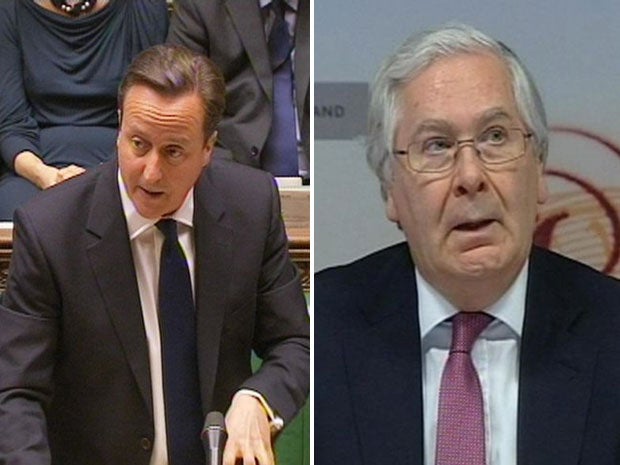David Cameron and Sir Mervyn King urge eurozone action

Sir Mervyn King and David Cameron led an attack on a lack of progress in tackling the eurozone crisis today as the region's problems threatened to hamper UK growth.
The Bank of England governor said the single-currency bloc was "tearing itself apart without any obvious solution" while the Prime Minister said the area faced a "make up or break up" scenario.
The stark warnings came as financial markets suffered further losses as Greek leaders braced themselves for fresh elections after talks to form a coalition government failed.
Presenting the Bank's quarterly inflation report, Sir Mervyn confirmed he and his colleagues were working on contingency plans in the event of a worst-case scenario for the euro.
Warning that the UK was at risk of being in the path of the eurozone storm, the Governor ruled out a return to pre-financial crisis levels of growth before 2014 - with the Bank now expecting insignificant growth in 2012.
He repeated his calls for European leaders to deliver a "credible solution" to the region's crisis, while Mr Cameron later in the House of Commons urged his continental counterparts not to "put off" much-needed action.
In a further blow to UK households, the Bank said the rate of inflation will fall more slowly than previously expected, remaining above the Government's 2% target for the next year or so.
But even after slashing its growth forecasts to 0.8% in 2012 and 2% in 2013, down from 1.2% and 3% respectively, some economists said the Bank was still being "too optimistic", prompting expectations for more quantitative easing later this year.
Sir Mervyn warned that even with a "credible and effective" response from eurozone leaders, a prolonged period of sluggish growth and heightened uncertainty was still likely for the region.
He said: "We are navigating through turbulent waters, with the risk of a storm heading our way from the continent. We don't know when the storm clouds will move away."
Sir Mervyn confirmed plans were being drawn up by the Bank, the Treasury and Financial Services Authority in the event of a major financial catastrophe, such as the break-up of the eurozone.
While the Bank said it did not see a "meaningful way" of factoring into its projections an extreme financial event, it said the biggest risk to recovery stemmed from the eurozone.
London's leading shares index, the FTSE 100 Index, lost nearly 1% at one stage today as troubles in Greece threatened to take the crisis to even more serious levels.
The country could be denied further EU bailout funds if a party opposing necessary austerity measures comes to power, which could in turn lead to Greece exiting the euro.
The troubles in Greece came after the newly-installed French president, Francois Hollande, was in Berlin arguing that the German-led austerity strategy was too rigid and must be balanced with effective growth initiatives.
Mr Cameron has repeatedly made the case for the eurozone to take "decisive action" to restore stability.
He told MPs: "If the eurozone wants to continue as it is, then it has got to build a proper firewall, it has got to take steps to secure the weakest members of the eurozone, or it is going to have to work out if it has to go in a different direction.
"It either has to make up, or it is looking at a potential break-up."
Earlier, Sir Mervyn said weak growth and high inflation have been the unavoidable consequences of the financial crisis, that have been "painful for everyone in our society".
While the Governor said the bigger picture was one of gradual recovery in growth, the impact of the Queen's Diamond Jubilee could knock 0.5% off GDP growth in the second quarter, prolonging the double-dip recession.
And the consumer prices index rate of inflation is not likely to meet the 2% target until mid-2013, rather than the end of the year, and will still be around 2.5% at the end of this year.
David Kern, chief economist at the British Chambers of Commerce (BCC), said: "Though the Bank of England has revised down forecasts for growth, they may still be too optimistic."
The Bank pumped £50 billion into its quantitative easing (QE) programme in February but members of the monetary policy committee (MPC) vetoed increasing the stock of asset purchases from £325 billion at their last meeting.
While the current projections assume no change to the QE programme and holding interest rates at historic lows of 0.5% until at least half way through 2013, some economists expect the Bank to start up the money-printing press later this year.
Vicky Redwood, chief UK economist at Capital Economics, said: "We still expect QE to be resumed later this year - and even within the next month or two if the eurozone crisis continues to escalate."
The Bank's gloomier view of the UK comes after official figures showed the economy had slipped back into recession following a 0.2% contraction in output in the first quarter of the year.
PA
Subscribe to Independent Premium to bookmark this article
Want to bookmark your favourite articles and stories to read or reference later? Start your Independent Premium subscription today.

Join our commenting forum
Join thought-provoking conversations, follow other Independent readers and see their replies